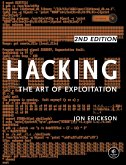Low Tech Hacking teaches your students how to avoid and defend against some of the simplest and most common hacks. Criminals using hacking techniques can cost corporations, governments, and individuals millions of dollars each year. While the media focuses on the grand-scale attacks that have been planned for months and executed by teams and countries, there are thousands more that aren't broadcast. This book focuses on the everyday hacks that, while simple in nature, actually add up to the most significant losses. It provides detailed descriptions of potential threats and vulnerabilities, many of which the majority of the information systems world may be unaware. It contains insider knowledge of what could be your most likely low-tech threat, with timely advice from some of the top security minds in the world.
Author Jack Wiles spent many years as an inside penetration testing team leader, proving that these threats and vulnerabilities exist and their countermeasureswork. His contributing authors are among the best in the world in their respective areas of expertise. The book is organized into 8 chapters covering social engineering; locks and ways to low tech hack them; low tech wireless hacking; low tech targeting and surveillance; low tech hacking for the penetration tester; the law on low tech hacking; and information security awareness training as a countermeasure to employee risk.
This book will be a valuable resource for penetration testers, internal auditors, information systems auditors, CIOs, CISOs, risk managers, fraud investigators, system administrators, private investigators, ethical hackers, black hat hackers, corporate attorneys, and members of local, state, and federal law enforcement.
Contains insider knowledge of what could be your most likely Low Tech threat Includes timely advice from some of the top security minds in the world Covers many detailed countermeasures that you can employ to improve your security posture
Hinweis: Dieser Artikel kann nur an eine deutsche Lieferadresse ausgeliefert werden.
Author Jack Wiles spent many years as an inside penetration testing team leader, proving that these threats and vulnerabilities exist and their countermeasureswork. His contributing authors are among the best in the world in their respective areas of expertise. The book is organized into 8 chapters covering social engineering; locks and ways to low tech hack them; low tech wireless hacking; low tech targeting and surveillance; low tech hacking for the penetration tester; the law on low tech hacking; and information security awareness training as a countermeasure to employee risk.
This book will be a valuable resource for penetration testers, internal auditors, information systems auditors, CIOs, CISOs, risk managers, fraud investigators, system administrators, private investigators, ethical hackers, black hat hackers, corporate attorneys, and members of local, state, and federal law enforcement.
Contains insider knowledge of what could be your most likely Low Tech threat Includes timely advice from some of the top security minds in the world Covers many detailed countermeasures that you can employ to improve your security posture
Hinweis: Dieser Artikel kann nur an eine deutsche Lieferadresse ausgeliefert werden.
"In Low Tech Hacking: Street Smarts for Security Professionals, the authors, all information security veterans, bring their collective experience to the printed word and show how low-tech hacks can be just as devastating as a large-scale directed attack.Overall, [it] is a value reference for security professionals to use to ensure they are securing their networks adequately, to fend off the average attacker.The authors have written a book that is light on theory, but heavy on actionable things the reader can quickly do to secure their network. And that is a very good thing."--Security Management, February 2013 and other publications
"In the age of extreme technology, the defenders have made Low Tech a low priority, concentrating more on the common high tech solutions intended to protect organizations. But attackers are resurrecting the art of Low Tech Hacking. The techniques discussed in this book are given new life because they allow attackers to strike at the weakest links: human and physical. This book is the right tool to bring the Low Tech back into focus."--Greg Miles, Ph.D., CISSP, CISA, Principal at Peak Security, Inc.
"Low Tech Hacking is perfect for waking people up to the dangers that lurk on the Internet and especially in their physical environment. All chapters are littered with helpful tips and warnings, which more often then not include the authors' 'war stories' as illustrative examples. And even though the book has been written by five different authors, they all do a great job at keeping the explanations and examples clear and concise, and at making us think for ourselves and consider things we never marked before. In short, I would effectively recommend this book to everyone."--Net-Security.org
"While the media focuses on grand-scale hacking, companies are losing money every day from simpler hacking techniques. This book, by Jack Wiles, Terry Gudaitis, Jennifer Jabusch, Russ Rogers and Sean Lowther, details less sophisticated hacking techniques, such as social engineering, wireless hacking, and surveillance to gain valuable data, and offers countermeasures."--iWeek Magazine.com
"All in all, Low Tech Hacking is a great overview of unconventional offensive and defensive methods to secure an organization. It will not make testers experts on physical security or wireless attacks all of a sudden, but it is a lively and useful starting point for further reading and training and a handy reference during an audit, too."--Computers and Security 31 {2012} 738
"In the age of extreme technology, the defenders have made Low Tech a low priority, concentrating more on the common high tech solutions intended to protect organizations. But attackers are resurrecting the art of Low Tech Hacking. The techniques discussed in this book are given new life because they allow attackers to strike at the weakest links: human and physical. This book is the right tool to bring the Low Tech back into focus."--Greg Miles, Ph.D., CISSP, CISA, Principal at Peak Security, Inc.
"Low Tech Hacking is perfect for waking people up to the dangers that lurk on the Internet and especially in their physical environment. All chapters are littered with helpful tips and warnings, which more often then not include the authors' 'war stories' as illustrative examples. And even though the book has been written by five different authors, they all do a great job at keeping the explanations and examples clear and concise, and at making us think for ourselves and consider things we never marked before. In short, I would effectively recommend this book to everyone."--Net-Security.org
"While the media focuses on grand-scale hacking, companies are losing money every day from simpler hacking techniques. This book, by Jack Wiles, Terry Gudaitis, Jennifer Jabusch, Russ Rogers and Sean Lowther, details less sophisticated hacking techniques, such as social engineering, wireless hacking, and surveillance to gain valuable data, and offers countermeasures."--iWeek Magazine.com
"All in all, Low Tech Hacking is a great overview of unconventional offensive and defensive methods to secure an organization. It will not make testers experts on physical security or wireless attacks all of a sudden, but it is a lively and useful starting point for further reading and training and a handy reference during an audit, too."--Computers and Security 31 {2012} 738








